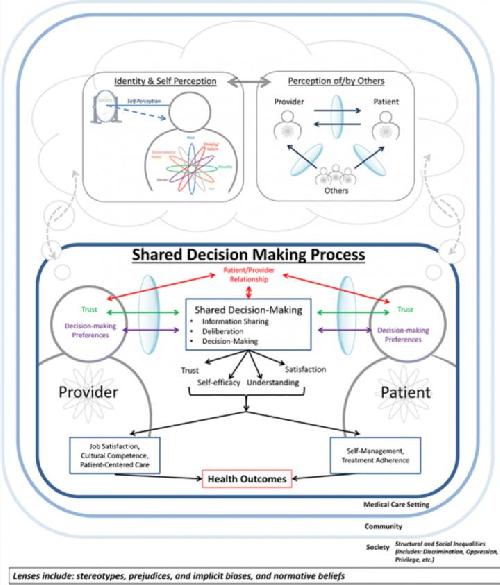Lesbian, gay, bisexual, transgender and queer (LGBTQ) patients who are also racial and ethnic minorities suffer significant health disparities, while facing more complicated challenges than white LGBTQ or racial and ethnic minority patients alone. Now, in a series of three articles published Thursday in the Journal of General Internal Medicine, researchers from the University of Chicago Medicine provide a roadmap to help health providers better understand the unique needs of patients with multiple minority identities who face these overlapping health challenges.
"Racial/ethnic, sexual orientation, and gender identity minority status are all marginalized social identities, so they act in concert to further marginalize people who are trying to navigate the health care system," said Monica Peek, MD, MPH, Associate Professor of Medicine and lead author of one of the papers.
The UChicago team hopes their work will help those with multiple minority identities as well as the clinicians who serve them create best practices that will help this group practice shared decision-making, a process in which doctors and patients work together to make decisions about complex medical issues and development treatment plans based on patient preferences and values.
 This is a conceptual model of shared decision making among LBGT African-Americans. Credit: Peek, et al. JGIM, March 17, 2016.
This is a conceptual model of shared decision making among LBGT African-Americans. Credit: Peek, et al. JGIM, March 17, 2016.
"One of the things that we're trying to understand better is how people make choices about health care when they are standing at the intersection of multiple social groups that have historically experienced societal discrimination and disparities in health care delivery," Peek said.
LGBTQ patients who are also racial/ethnic minorities have a higher risk for poor health outcomes than white LGBTQ patients. These identities can operate independently or together to influence the patient's relationship with health care providers and decisions about their care. For example, racial/ethnic minority patients who also hold minority sexual orientation or gender identities may be less likely to share their status with a white health provider, which shuts down an opportunity to receive crucial preventive care.
Unfortunately, most clinicians are not prepared to address the needs of patients at the intersection of LGBTQ and racial/ethnic minority identities, and little research exists on this population's preferences for doctor-patient communication and shared decision-making. The UChicago Medicine team, hoping to provide resources to colleagues across the country, begins to address these gaps in the three articles. The series includes:
- A conceptual model developed by Peek, Fanny Lopez, MPP, H. Sharif Williams, PhD, and John Schneider, MD, which illustrates how race/ethnicity, sexual orientation and gender identity influence shared decision making among African-American LGBT patients and their health care providers.
- A review of research literature on decision aids for minority patients by Aviva Nathan, MPH, and Elbert Huang, MD, MPH, FACP, showing that while very little research on such educational tools exists, they can be effective in improving doctor-patient communication and health outcomes for health issues that are specific to minority populations.
- A model of training, education and organizational structure developed by Rachel DeMeester, MPH, Fanny Lopez, MPP, Scott Cook, PhD, and Marshall Chin, MD, MPH, describing ways in which clinical facilities and processes can be designed to facilitate better shared decision-making, including patient care workflows, information technology, organizational culture, physical design of clinic space, training, education and incentive models.
"The ultimate goal is to improve the health of LGBTQ patients of color by developing tools and resources to help clinicians and these patients engage in better shared decision-making," said Chin, Associate Chief and Director of Research of the Section of General Internal Medicine and lead author of an editorial introducing the work.
The work is part of a JGIM symposium, "Improving Shared Decision Making with LGBT Racial and Ethnic Minority Patients," and was supported by the Agency for Healthcare Research and Quality (1U18 HS023050) and the Robert Wood Johnson Foundation Finding Answers: Disparities Research for Change Program.
Additional authors for the editorial, "Improving Shared Decision with LGBT Racial and Ethnic Minority Patients," include Fanny Lopez, Aviva Nathan and Scott Cook. Additional authors for the article, "Development of a Conceptual Framework for Understanding Shared Decision Making Among African-American LGBT Patients and their Clinicians," include Lucy Xu, Moira McNulty, and M. Ellen Acree. Additional authors for the article, "Use of Decision Aids with Minority Patients: A Systematic Review," include Imani Marshall and Jennifer Cooper. Additional authors for the article, "A Model of Organizational Context and Shared Decision Making: Application to LGBT Racial and Ethnic Minority Patients," include Jennifer Moore.
source: University of Chicago Medical Center